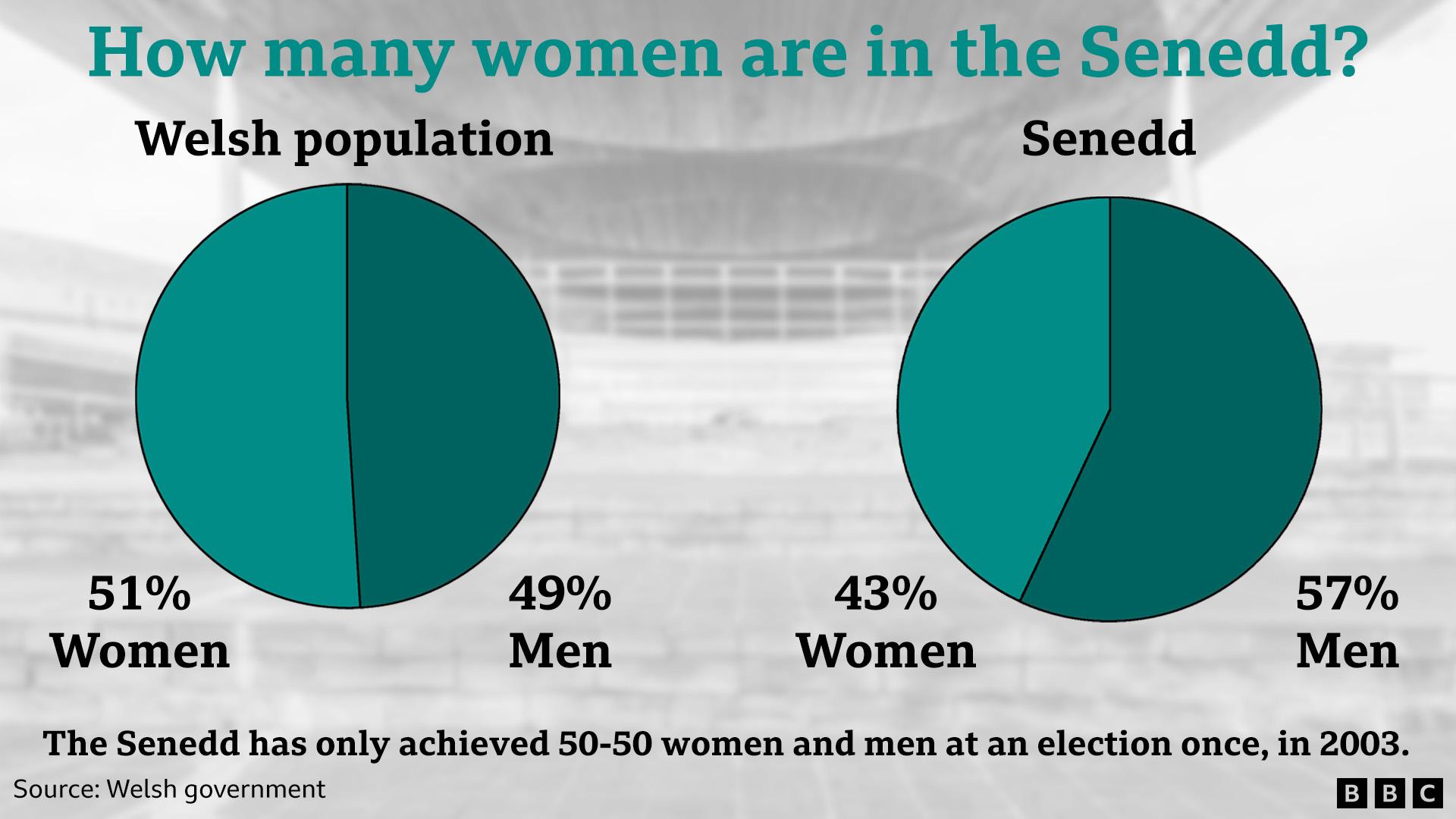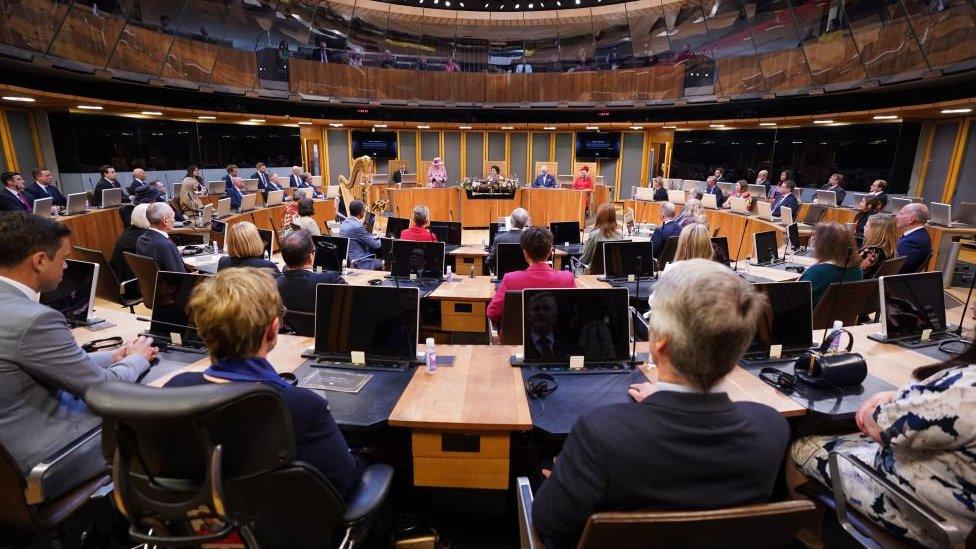Politician gender quotas not in Senedd powers - presiding officer
- Published

The Welsh government has published plans to force parties to draw up candidate lists that are 50% women
The Senedd does not have the power to pass a law to boost the representation of women in the Welsh Parliament, its presiding officer has said.
On Monday the Welsh government published plans forcing parties to draw up lists of candidates that are at least 50% women.
Elin Jones said the new law trod on issues controlled by the Westminster parliament.
But the Welsh government says it disagrees with Ms Jones' legal advice.
Under the plans, parties will be required to have at least 50% women at the next Senedd election in 2026, but a controversial proposal to count transgender women as women from a leaked draft did not appear in Monday's published legislation.
Whether the Senedd has the power to pass the legislation - backed by both Labour and Plaid Cymru - has been a matter of debate for some time.
Although the government believes the powers exist to pass the law, the gender reforms were split off from the overall scheme to expand the Senedd to 96 members to prevent a legal challenge from stopping the whole plan.
The advice does not stop the Senedd from passing the legislation, but that in turn would not stop a legal challenge by the UK government, or by other groups.
Under the plans for a bigger parliament, due to come into effect at the next election in 2026, all seats in the Senedd will be elected through lists.
Once the gender quota bill is passed, lists from political parties will need to be made up of at least 50% women candidates.
Lists would be ordered in who would be elected first in a system that aims to represent more accurately how people vote. A candidate who is not a woman, the bill says, must be followed on the list by a woman.
The first name on at least half of a political party's list must also be a woman.
A leaked draft of the legislation had suggested that the bill would specify that a woman would include a transgender woman, including someone planning gender reassignment.
No such clause is in the version of the bill published on Monday. It is understood that it will be a matter for individual candidates to determine if they state whether they are a woman or not - effectively self-certifying.

In a notice issued to the Senedd on Monday, presiding officer Elin Jones said that in her view, the provisions of the bill "would not be within the legislative competence of the Senedd".
Legislative competence is a term used to describe whether the Senedd has the power to pass a law, or whether the matter is reserved to Westminster to deal with.
Ms Jones said the bill "relates to the reserved matters of equal opportunities" and "modifies the law on reserved matters, namely the Equality Act 2010".
How many women are in the Senedd?
The government's case for the bill says that while 51% of the population are women and 49% are men, the Senedd is made up of 43% women and 57% men.
The Senedd has only achieved 50-50 women and men at an election once, in 2003.
In a letter to members of two Senedd committees Elin Jones said the bill relates to the reserved matter of equal opportunities.
She said it also modifies a section of the Equality Act 2010, which makes special provision for political parties to allow them to adopt discriminatory selection arrangements.
She said it turns the voluntary provision in the 2010 act into a duty, bringing it into conflict with the law. The Senedd is not permitted to change laws that concern areas controlled in Westminster.
In a statement, the Welsh government said: "While recognising and respecting the Llywydd's view on competence, the minister for social justice... has set out her view that the provisions of the Bill are within the Senedd's legislative competence.
"Given that these reforms originated with the Senedd itself, it is only right to return this matter to the Senedd for consideration. The only way to achieve this is to introduce this Bill and for it to proceed to stage one scrutiny."
It is the first time a Senedd presiding officer has said a proposed government law is entirely outside of the powers of the institution.
The Welsh Conservatives are opposing the legislation.
Senior Welsh Tory Darren Millar said: "We believe that candidates should be chosen and elected to our national parliament on the basis of merit, not because of their self-identified gender, biological sex, sexuality, race, religion or disability.
"While we all want to see greater diversity in our politics, we will always reject any system which seeks to pit one aspect of diversity over another."
The plans were originally due to be published last November, but were postponed at the last minute.
The minister responsible has also changed, from Deputy Minister for Social Partnership Hannah Blythyn, to Social Justice Minister Jane Hutt.
Ms Hutt said: "Twenty years ago Wales made history when 50% of members elected to the then National Assembly were women, but that number has since fallen.
"This bill aims to achieve a gender balanced Senedd. Having a Senedd which better reflects the make-up of Wales is good for politics, good for representation and good for policy making."
Leader of Plaid Cymru, Rhun ap Iorwerth, said: "The reforms being put forward are a leap forward in strengthening democracy in Wales so that the Senedd reflects our modern nation."

INSEPARABLE SISTERS: The seven-year-old conjoined twins who defied all odds
JUNE: VOICE OF A SILENT TWIN: The tragic story of June, her sister and their life in Broadmoor

Related topics
- Published8 June 2022

- Published31 October 2023

- Published5 March 2024

- Published30 January 2024
